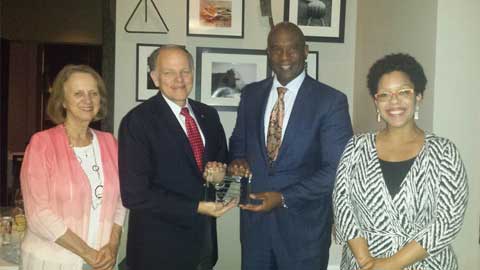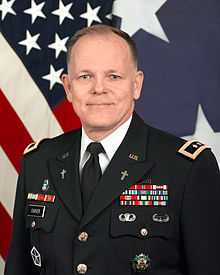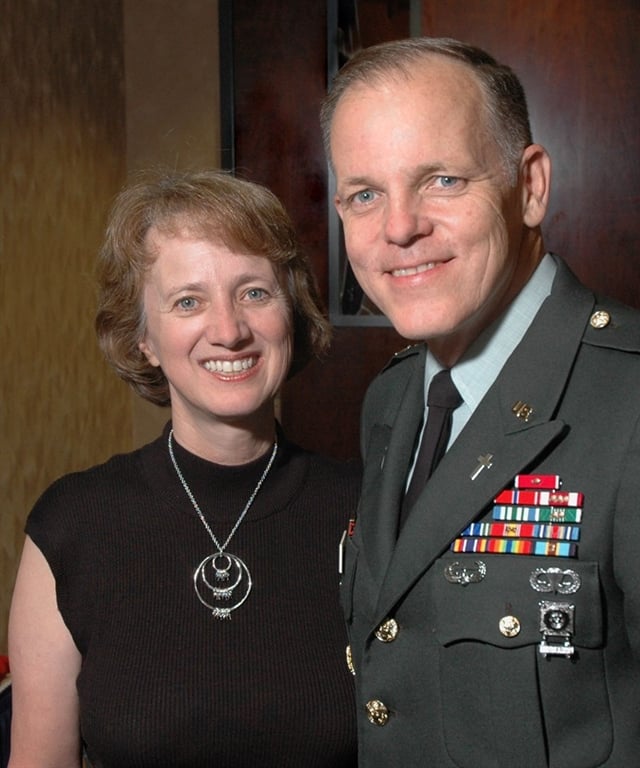
Two-star Retired US Army General Doug Carver was first inspired by the idea of a military chaplain in 1965, when Lt. Col. George Fox, a chaplain at Fort Bragg, North Carolina, visited Carver’s home church in Rome, Georgia. “A preacher in uniform,” says Carver. “That image stuck with me.”
That image came back to him at the start of his 10th year as a US Army field artillery officer. On a ministry trip to Colorado, he was talking around a roaring campfire with Dean Bryan, a deacon from his church. Carver recalls, “He asked me, ‘What are you going to do with the rest of your life?’ I thought about it and said I wanted to serve 20 or 30 years in the military, and then I want to go to seminary. Dean thought about it and said, ‘Don’t give God the leftovers.’ That really hit me.”
That image came back to him at the start of his 10th year as a US Army field artillery officer. On a ministry trip to Colorado, he was talking around a roaring campfire with Dean Bryan, a deacon from his church. Carver recalls, “He asked me, ‘What are you going to do with the rest of your life?’ I thought about it and said I wanted to serve 20 or 30 years in the military, and then I want to go to seminary. Dean thought about it and said, ‘Don’t give God the leftovers.’ That really hit me.”
Carver resigned his Army commission and entered the Southern Baptist Theological Seminary in Louisville, Kentucky. He earned his Master of Divinity degree in 1982, and for the next 25 years he served as an active-duty Army chaplain. In 2007, President George W. Bush appointed Carver to a four-year term as chief of chaplains for the Army, based at the Pentagon. He was the first Baptist minister to hold the position in 50 years.
At the time, the US was fighting dual wars in Iraq and Afghanistan. “Every day you had soldiers in harm’s way,” Carver says. In all, he was responsible for some 2,900 chaplains in the active Army, the Army Reserves, and the National Guard. These chaplains provided religious support to a total of 1.2 million soldiers deployed in more than 80 nations, along with 300,000 Department of Defense civilians and 700,000 military families. “Part of our job was helping our chaplains maintain their pastoral identity and spiritual focus,” says Carver. “This includes all faiths. There are 225 types of chaplains.”
The Path to Chaplaincy
At the time, the US was fighting dual wars in Iraq and Afghanistan. “Every day you had soldiers in harm’s way,” Carver says. In all, he was responsible for some 2,900 chaplains in the active Army, the Army Reserves, and the National Guard. These chaplains provided religious support to a total of 1.2 million soldiers deployed in more than 80 nations, along with 300,000 Department of Defense civilians and 700,000 military families. “Part of our job was helping our chaplains maintain their pastoral identity and spiritual focus,” says Carver. “This includes all faiths. There are 225 types of chaplains.”
The Path to Chaplaincy
Carver came to UT in 1969 as a premed student but switched his major to religious studies with a minor in psychology. “Religious culture and how the world views it have always been interesting to me,” he says. “Professor David Dungan taught us about great religions, ancient civilizations, the Dead Sea Scrolls.”
Carver was also in Army ROTC, where Col. William Skidmore was his professor of military science. “I fell in love with the military, the scabbard and blade, the old Mexican War uniforms.”
Back at East Rome High School, Carver had played trombone in the marching band.
Carver was also in Army ROTC, where Col. William Skidmore was his professor of military science. “I fell in love with the military, the scabbard and blade, the old Mexican War uniforms.”
Back at East Rome High School, Carver had played trombone in the marching band.

In his senior year, he had met freshman clarinet player Susan Gray, known as Sunny. During his UT years, Carver drove home on weekends to play keyboards, saxophone, and guitar and sing with soul and rock bands. Appropriately, his repertoire included Marvin Gaye’s “Sunny.” Carver and Sunny were married in 1973, the same year he graduated, joined the Army, and was stationed first at Fort Carson, Colorado, and then Germany as a field artillery officer.
After his campfire revelation, Carver’s first chaplaincy was at Fort Campbell, Kentucky. On December 12, 1985, a plane returning from Sinai crashed in Newfoundland, killing 248 soldiers. Carver made hundreds of calls informing families that their loved ones weren’t coming home and presided at memorial services for several months. “I learned a lot about the ministry and the importance of the chaplain,” he says.
From 1999 to 2001, he earned his master’s in strategic studies from the Army War College in Carlisle, Pennsylvania. “I learned how the Army works,” he says. From 2002 to 2004, he served as senior chaplain for V Corps and Combined Joint Task Force 7 in Germany and Iraq. These jobs helped prepare him for his role as chief of chaplains from 2007 to 2011.
In August of 2010, a chaplain was killed in Afghanistan. “He was the first chaplain killed in action in 40 years,” says Carver.
Then as now, the armed forces were seeking answers to a troubling increase in the rate of suicides. “Almost every hour, a service member takes his life,” says Carver. “This is a challenge for spirituality. I feel that faith, belief, and practice can mitigate certain circumstances. In this, religion is important. We’re not going to say which religion, but spirituality can make you more resilient. You can be more combat ready and focused with an active spiritual life. An active spiritual life can help you feel more connected to others, and so often a feeling of being disconnected seems to be a factor in suicides.”
In 2011, Carver retired from the Army. He and Sunny settled in Waxhaw, North Carolina, to be near their two daughters and four grandchildren.
After his campfire revelation, Carver’s first chaplaincy was at Fort Campbell, Kentucky. On December 12, 1985, a plane returning from Sinai crashed in Newfoundland, killing 248 soldiers. Carver made hundreds of calls informing families that their loved ones weren’t coming home and presided at memorial services for several months. “I learned a lot about the ministry and the importance of the chaplain,” he says.
From 1999 to 2001, he earned his master’s in strategic studies from the Army War College in Carlisle, Pennsylvania. “I learned how the Army works,” he says. From 2002 to 2004, he served as senior chaplain for V Corps and Combined Joint Task Force 7 in Germany and Iraq. These jobs helped prepare him for his role as chief of chaplains from 2007 to 2011.
In August of 2010, a chaplain was killed in Afghanistan. “He was the first chaplain killed in action in 40 years,” says Carver.
Then as now, the armed forces were seeking answers to a troubling increase in the rate of suicides. “Almost every hour, a service member takes his life,” says Carver. “This is a challenge for spirituality. I feel that faith, belief, and practice can mitigate certain circumstances. In this, religion is important. We’re not going to say which religion, but spirituality can make you more resilient. You can be more combat ready and focused with an active spiritual life. An active spiritual life can help you feel more connected to others, and so often a feeling of being disconnected seems to be a factor in suicides.”
In 2011, Carver retired from the Army. He and Sunny settled in Waxhaw, North Carolina, to be near their two daughters and four grandchildren.
In 2012, Carver was offered a new challenge, as executive director of chaplaincy for the North American Mission Board. In that role, he is responsible for the strategic, professional, and pastoral support of 3,800 Southern Baptist chaplains who minister in institutional settings—from police departments and correctional institutions to hospitals and corporations—in the United States and around the world. Some 1,500 of the NAMB-commissioned chaplains serve in the US military.
“Our chaplains frequently minister in places where the church hasn’t been or cannot go,” says Carver, still carrying on a mission he began by a Colorado campfire, “especially in dangerous or desperate situations where people need pastoral care.”
“Our chaplains frequently minister in places where the church hasn’t been or cannot go,” says Carver, still carrying on a mission he began by a Colorado campfire, “especially in dangerous or desperate situations where people need pastoral care.”
